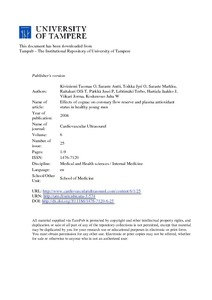Effects of cognac on coronary flow reserve and plasma antioxidant status in healthy young men
Kiviniemi, Tuomas O; Saraste, Antti; Toikka, Jyri O; Saraste, Markku; Raitakari, Olli T; Pärkkä, Jussi P; Lehtimäki, Terho; Hartiala, Jaakko J; Viikari, Jorma; Koskenvuo, Juha W (2008)
Kiviniemi, Tuomas O
Saraste, Antti
Toikka, Jyri O
Saraste, Markku
Raitakari, Olli T
Pärkkä, Jussi P
Lehtimäki, Terho
Hartiala, Jaakko J
Viikari, Jorma
Koskenvuo, Juha W
2008
Cardiovascular Ultrasound 6
25
This publication is copyrighted. You may download, display and print it for Your own personal use. Commercial use is prohibited.
Julkaisun pysyvä osoite on
https://urn.fi/urn:nbn:uta-3-574
https://urn.fi/urn:nbn:uta-3-574
Kuvaus
BioMed Central Open access
Tiivistelmä
Background
The cardioprotective effects of certain alcoholic beverages are partly related to their polyphenol content, which may improve the vasodilatory reactivity of arteries. Effect of cognac on coronary circulation, however, remains unknown. The purpose of this randomized controlled cross-over study was to determine whether moderate doses of cognac improve coronary reactivity as assessed with cold pressor testing (CPT) and coronary flow reserve (CFR) measument.
Methods
Study group consisted of 23 subjects. Coronary flow velocity and epicardial diameter was assessed using transthoracic echocardiography at rest, during CPT and adenosine infusion-derived CFR measurements before drinking, after a moderate (1.2 ± 0.1 dl) and an escalating high dose (total amount 2.4 ± 0.3 dl) of cognac. To explore the bioavailability of antioxidants, the antioxidant contents of cognac was measured and the absorption from the digestive tract was verified by plasma antioxidant capacity determination.
Results
Serum alcohol levels increased to 1.2 ± 0.2‰ and plasma antioxidant capacity from 301 ± 43.9 μmol/l to 320 ± 25.0 μmol/l by 7.6 ± 11.8%, (p = 0.01) after high doses of cognac. There was no significant change in flow velocity during CPT after cognac ingestion compared to control day. CFR was 4.4 ± 0.8, 4.1 ± 0.9 (p = NS), and 4.5 ± 1.2 (p = NS) before drinking and after moderate and high doses on cognac day, and 4.5 ± 1.4, and 4.0 ± 1.2 (p = NS) on control day.
Conclusion
Cognac increased plasma antioxidant capacity, but it had no effect on coronary circulation in healthy young men.
The cardioprotective effects of certain alcoholic beverages are partly related to their polyphenol content, which may improve the vasodilatory reactivity of arteries. Effect of cognac on coronary circulation, however, remains unknown. The purpose of this randomized controlled cross-over study was to determine whether moderate doses of cognac improve coronary reactivity as assessed with cold pressor testing (CPT) and coronary flow reserve (CFR) measument.
Methods
Study group consisted of 23 subjects. Coronary flow velocity and epicardial diameter was assessed using transthoracic echocardiography at rest, during CPT and adenosine infusion-derived CFR measurements before drinking, after a moderate (1.2 ± 0.1 dl) and an escalating high dose (total amount 2.4 ± 0.3 dl) of cognac. To explore the bioavailability of antioxidants, the antioxidant contents of cognac was measured and the absorption from the digestive tract was verified by plasma antioxidant capacity determination.
Results
Serum alcohol levels increased to 1.2 ± 0.2‰ and plasma antioxidant capacity from 301 ± 43.9 μmol/l to 320 ± 25.0 μmol/l by 7.6 ± 11.8%, (p = 0.01) after high doses of cognac. There was no significant change in flow velocity during CPT after cognac ingestion compared to control day. CFR was 4.4 ± 0.8, 4.1 ± 0.9 (p = NS), and 4.5 ± 1.2 (p = NS) before drinking and after moderate and high doses on cognac day, and 4.5 ± 1.4, and 4.0 ± 1.2 (p = NS) on control day.
Conclusion
Cognac increased plasma antioxidant capacity, but it had no effect on coronary circulation in healthy young men.
Kokoelmat
- Artikkelit [6140]
